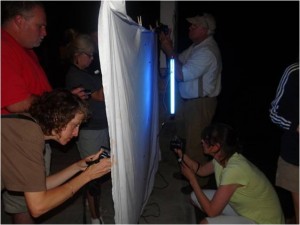Discover Life‘s mission is to assemble and share knowledge in order to improve education, health, agriculture, economic development, and conservation throughout the world.
We provide free on-line tools to identify species, share ways to teach and study nature’s wonders, report findings, build maps, process images, and contribute to and learn from a growing, interactive encyclopedia of life that now has 1,148,279 species pages.

Understanding the potential impacts of climate change, pollution, invasive species, and other large-scale factors on biological systems is a formidable task. It is not feasible to conduct randomized, replicated experiments at regional and continental scales. Instead we can use natural field experiments to study such phenomena (Hargrove and Pickering 1992). We are building a continental network of naturalists to collect large quantities of data for natural experiments.
Discover Life has developed protocols that enable all our participants to collect high quality data using digital photography, global positioning devices, cell phones, and web tools. For species identification, we use customized local online guides, automated flagging of unusual events, and oversight by taxonomists. We provide technical support, photographic albums to store images and edit associated information, mapping and analysis tools, and sharing of data via the web.

Why moths?
Moths are an ideal group to study for scientific, educational and logistic reasons — a fun pastime for naturalists and the scientifically inclined. For Mothing at its simplest, switch on your porch lights and wait in the safety of your home. After photographing them, switch your lights off and they fly away unharmed. Over the course of a year, hundreds of species are likely to come in, sit on your wall, and enable you to study them and enjoy their diversity. Read more
We’re utterly addicted to Mothing. Please join us and have fun too studying moths and other creatures of the night.